by Paul Homewood, September 1, 208 in NotaLotofPeopleKnowThat
With one day to go, it is clear that 2018 has been one of the hottest summers on record for the UK, however, the margin between the mean temperatures at the top of the league tables (records dating back to 1910) is so small that at this point it is impossible to say if 2018 will be an outright winner. It is very close to the record-breaking summers of 2006 (15.78C), 2003 (15.77C), and 1976 (15.77C) all of which are within 0.01C of each other.
The margin is so small that different datasets and different regions of the UK will have different ranking. Usually we will only quote statistics to the nearest 0.1C as differences smaller than this could result from small numerical differences arising from the statistical calculations. A more comprehensive analysis of the 2018 summer data will be undertaken early next week and data for summer 2018 will continue to be analysed over the coming months.
…
by Météo Paris, 25 août 2018
Malgré des températures particulièrement élevées ces dernières semaines sur l’Hémisphère Nord, voire exceptionnelles sur l’Europe, le déclin des glaces de l’Arctique s’est vu ralenti.
Au 23 août, l’étendue des glaces de l’Arctique était d’approximativement 4.945 millions de kilomètres carrés. Des niveaux toujours particulièrement bas au regard de la moyenne observée sur la période 1981-2010 (6.866 millions de km2, soit un déficit de 28%). Néanmoins, ce niveau n’est « que » le 6e plus bas observé à cette date, très loin de la triste année 2012 (une superficie inférieure à 4 millions de km2 à la fin août). Une timide amélioration, puisque l’étendue de ces glaces avait alors été la 4e plus faible jamais observée sur l’ensemble du mois de juin.
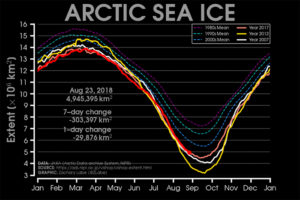
Graphique de l’étendue des glaces de l’océan Arctique (en millions de km2) – Zachary Michael Labe
…
nb se reporter à la courbe rouge/see red curve
by Dr. S. Lüning and Prof. F. Vahrenholt, August 31, 2018 in NoTricksZone
The playbook is well-known: After a drought, heat wave or flood occurs, journalists and climate alarmists fall all over themselves in the race to issue shrill warnings that this is only the beginning and that it is known that evil climate change is behind it.
This summer of 2018 we experienced again a Central European heat wave. However the usual alarmists failed again to provide any solid statistics on the frequency of heat waves during the last 100 and 1000 years.
Here we are glad to help out by presenting the latest results on heat wave trend in North America. Let’s begin with a spring heat wave in the USA in 2012 which was examined by Dole & Hoerling (2014) within a long-term context. The authors see a purely natural cause behind the unusual heat:
…
by Tony Heller, August 31, 2018 in ClimateChangeDispatch
Summer is over, and Greenland’s surface has gained 510 billion tons of ice over the past year – about 40% above normal. The surface mass budget is snow/ice accumulation minus melt.
…
S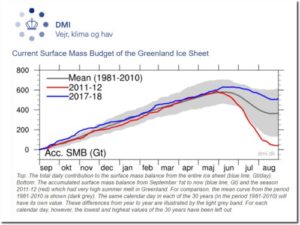
by Anthony Watts, August 30, 2018 in WUWT
Earth’s surface has undergone unprecedented warming over the last century, and especially in this century.
Every single year since 1977 has been warmer than the 20th century average, with 16 of the 17 warmest years on record occurring since 2001, and 2016 being the warmest year on recorded history. A study from 2016 found that without the emissions from burning coal and oil, there is very little likelihood that 13 out of the 15 warmest years on record would all have happened.
Source: https://www.ucsusa.org/global-warming/science-and-impacts/science/human-contribution-to-gw-faq.html
First a definition of the word “unprecedented”:
…
Note that “in this century” isn’t part of the definition. it says “never done or known before”
So in that spirit, here’s some other “unprecedented” warming in Earth’s history, via the Vostok Ice Core dataset:
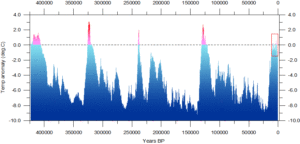
…
by Anthony Watts, August 30, 2018 in WUWT
After nearly every hurricane, heatwave, drought, or other extreme weather event, commentators rush to link the disaster with climate change. But what does the science say?
In this fully revised and updated edition of Disasters & Climate Change, renowned political scientist Roger Pielke Jr. takes a close look at the work of the Intergovernmental Panel on Climate Change, the underlying scientific research, and the climate data to give you the latest science on how climate change is related to extreme weather.
What he finds may surprise you and raise questions about the role of science in political debates.
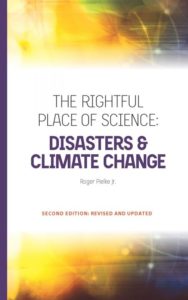
by Tony Heller, August 0, 2018 in ClimateChangeDispatch
The US had an unprecedented late summer heat wave from August 24 to September 6, 1953. The animation below shows the progression of the heat wave.
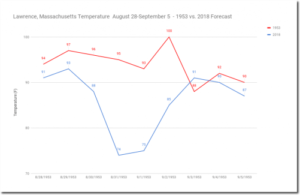
…
La géologie, une science plus que passionnante … et diverse





